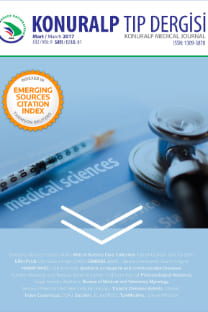MEFV Geni 761_764dupCCGC p.Asn256Argfs70, c.761_764dupCCGC Mutasyonlu Türkiyeden Bir Aile, Onların Klinik Özellikleri ve Literatür Taraması
FMF, MEFV Geni, Duplikasyon Mutasyonu, Tüm Ekzom Sekom Analizi
A Family From Turkey With 761_764dupCCGC (p.Asn256Argfs70,c.761_764dupCCGC) MEFV Gene Mutation,Their Clinical Features and Review of The Literature
FMF, MEFV Gene, Duplication Mutation,
___
- REFERENCES 1. Tunca M, Akar S,Onen F,et al.Turkish FMF Study Group. Familial Mediterranean fever (FMF) in Turkey: results of a nationwide multicenter study. Medicine (Baltimore) 2005;84(1):1-11. 2. The International FMF Consortium. Ancient missense mutations in a new member of the RoRet gene family are likely to cause familial Mediterranean fever. Cell 1997; 7:1317–25 3. Samuels J, Aksentijevich I, Torosyan Y, et al. Familial Mediterranean fever at the millennium. Clinical spectrum, ancient mutations, and a survey of 100 American referrals to the National Institutes of Health. Medicine (Baltimore) 1998;77:268–297 4. Touitou I, Sarkisian T, Medlej-Hashim M, et al. Country as the primary risk factor for renal amyloidosis in familial Mediterranean fever. Arthritis Rheum 2007;56:1706–1712 5. Soriano A , Manna R. Familial Mediterranean fever: New phenotypes. Autoimmunity Reviews 12;(2012) 31–37 6. Gershoni-Baruch R, Brik R, Zacks N, et al. The contribution of genotypes at the MEFV and SSA1 loci to amyloidosis and disease severity in patients with familial Mediterranean fever. Arthritis Rheum 2003;48:1149-55 7. Ozen S. Changing concepts in familial Mediterranean fever: is it possible to have an autosomal-recessive disease with only one mutation? Arthritis Rheum 2009;60:1575–1577. 8. Yilmaz G, Senes M, Kayalp D et al. Is Turkish MEFV Mutations Spectrum Different Among Regions. Journal of Clinical Laboratory Analysis 2016;00:1–4 9. Infevers 2016. Accessed 16 May 2016 [http://fmf.igh.cnrs.fr/ISSAID/infevers// 10. Eroz R, Dogan M, Kocabay K. A novel mutation K447M (p.Lys447Met, c.1340 A>T) Identified in exon 4 of the MEFV gene. Genetic Counseling 2016, 27:(4):525-528 11. Booth DR, Booth SE, Rowczenio Ret al. Congress abstract FMF 2002, La Grande Motte, France, 2002. 12. Eroz R, Doğan M, Yuce H et al. A Novel Deletion Mutation 334-335 DelG (P.Glu112fs, C.334-335delg) Identified In Exon 2 Of The MEFV Gene Associated With Familial Mediterranean Fever. Congress abstract,14. Ulusal Tıbbi Biyoloji ve Genetik Kongresi 27 – 30 Ekim 2015 Ölüdeniz /Fethiye 13. Eroz R, Doğan M, Yuce H et al. A Turkish Family With A89T (p. Ala89Thr, c.265G>A) Mutation In Exon 1 Of The MEFV Gene. Erciyes Medical Journal 2016 38 (1):42. 14. Oztuzcu S, Ulaslı M, Ergun S et al. Screening of common and novel familial mediterranean fever mutations in south-east part of Turkey.Mol Biol Rep. 2014;41(4):2601-7.
- ISSN: 1309-3878
- Yayın Aralığı: 3
- Başlangıç: 2009
- Yayıncı: Düzce Üniversitesi Tıp Fakültesi Aile Hekimliği AD adına Yrd.Doç.Dr.Cemil Işık Sönmez
Agah Bahadır ÖZTÜRK, Bilge SÖNMEZ
Neslihan ERKURAN, SEBAHAT GÜCÜK
Recep ERÖZ, Mustafa DOĞAN, Hüseyin YÜCE, Recep ÖZMERDİVENLİ
Sağlık Kuruluna Başvuru Nedenlerinin Değerlendirilmesi
Ali Ramazan BENLİ, Şenay Demir YAZICI, Onur YAZICI, Mustafa ÇÖRTÜK, Habibe İNCİ, Neriman BENLİ ÇETİN
RUHUŞEN KUTLU, Seher SAYIN, Ahmet KOÇAK
Demet Merder COŞKUN, Candan Kendir ÇOPURLAR, Hakan MUT, Süheyla ATALAY, Tuğba ONAT, Halil Volkan TEKAYAK, Hilal Toplu ÖZTÜRK, Saliha ŞAHİN, Merve KARADEMİRCİ, Kübra MAKARA, Ozan ŞENGÜL
Türkiye’de Büyüyen Tehlike: Esrar
Tip 2 Diyabet Hastalarında Psikolojik Belirtilerin İncelenmesi
Özlem KIZILTAŞ, İsmail Arslan, Oğuz TEKİN, İZZET FİDANCI, Berkay KIZILTAŞ, Arzu KUZULU, Mustafa ÇELİK, Emine ÇİĞDEM
